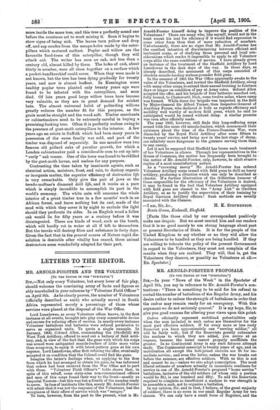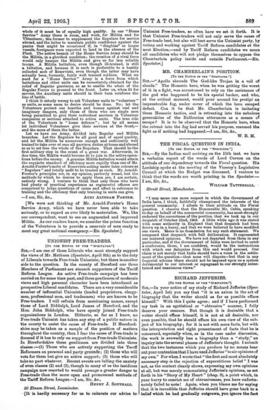MR. ARNOLD-FORSTER'S PROPOSALS.
[TO TRIG EDITOR OP TUE 'EPRCTATOR."3
Sin,—In your "News of the Week" in the Spectator of April 8th, you say in reference to Mr. Arnold-Forster's con- tentions: "There is something to be said for his refusal to curtail the number of battalions of the Regular Army, and his desire rather to reduce the strength of battalions in order that the cadres may remain ready for an emergency. With this argument we do not seriously quarrel." It is my hope, Sir, to give you good reasons for altering your views upon this point.
Cadres efficiently represent mobilised potentialities only when the men included in such cadres are themselves for the most part effective soldiers. If for every more or less rusty Reservist you have approximately one "serving soldier," all will be fairly well ; but if the Reservists greatly outnumber the nucleus to which they are added, you arrive al an impasse, because the lesser cannot properly assifililate the greater. In no Continental Army is any such fatuous attempt made. The Continental conscript is twenty years of age, and on mobilisation all except the last-joined recruits are fit for im- mediate service ; and even the latter, unless the war breaks out before the summer, are effective soldiers. With us this is not and cannot be so,—unless we also adopt conscription. The most liberal estimate of numbers actually in immediate readiness for service in one of Mr. Arnold-Forster's proposed "home service" battalions, inclusive of the old soldiers (of whom only a portion would be fit), is one hundred and fifty. To add the Reservists required to complete so insufficient a nucleus to war strength is to assemble a mob, not to organise a battalion.
In my opinion, Sir, and in that, I believe, of the great majority of soldiers, there is no room in our small Regular Army for two classes. We can only have a small force of Regulars, and the
whole of it must be of equally high quality. In our "Home Service" Army there is room, and work, for Militia and for ltoltmteers ; the former to supplement the Regulars for service abroad, and the latter to maintain public confidence against the panics that might be occasioned if, in "dinghies" or larger vessels, foreigners were expected to land in the absence of the Fleet. The active branch of the Home Service Army should be the Militia, in a glorified condition ; the creation of a rival force would only hamper the Militia and give us far less reliable troops. A Militia battalion, even though ill-trained, is still a battalion, and because it is such is preferable to a hastily collected mob of Reservists, even though the latter may have actually been, formerly, fairly well trained soldiers. What we need for a "Home Service" Army is a force from which battalions and other units can be immediately obtained for the relief of Regular garrisons, so as to enable the whole of the Regular Forces to proceed to the front. Later on, when fit for service, the Auxiliary units should in their turn reinforce the line of battle.
I think it utterly wrong to ask Volunteer units to "volunteer" as units, as some seem to desire should be done. No; let the Volunteers protect our hearths and homes against real and imaginary dangers, only those of them who are single men being permitted to give their individual services in Volunteer companies or sections attached to active units. The true role of the Volunteers is "home defence" ; but by all means let individual Volunteers give their services at the front,— and the more of them the better.
Let us have one Army, divided into Regular and Militia branches. Let the Regulars be all good and of equal quality, and let 'the Militia be numerous enough and sufficiently well trained to take over at once all garrison duties at home and abroad so as to set free the whole of the Regulars. That should be the first military step in the event of a great war. Afterwards, in due time, the Militia would become fit to join in the active opera- tions before the enemy. A genuine Militia battalion would attain the requisite standard of efficiency more rapidly than one of Mr. Arnold-Forster's mobs of Reservists sailing under false colours as " Regulars " and totally unfit to be trusted as such. Mr. Arnold- Forster's principles are, in my opinion, perfectly sound, but the methods by which he desires to apply them are, I am certain, entirely wrong. I venture to think that only those who have had plenty of practical experience as regimental officers are competent to judge questions of cause and effect in reference to training and the efficiency that only training in units can give.
[We were not thinking of Mr. Arnold-Forster's Home Service Army, which we have never been able to take seriously, or to regard as ever likely to materialise. We, like our correspondent, want to see an augmented and improved Militia. As our readers know, we consider the prime function of the Volunteers is to provide a reservoir of men ready to meet any great national emergency.—En. Spectator.]



































 Previous page
Previous page